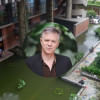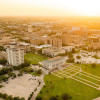How CHRF is redefining single-cell genomics in Bangladesh

For the first time in Bangladesh, Child Health Research Foundation (CHRF) has successfully generated single-cell genomic (SCG) data for the Human Cell Atlas (HCA).
This feat was realised through the support of the Chan Zuckerberg Initiative, which funded the 'Global Pediatric Cell Atlas of Nasal and Oral Mucosa' project. CHRF, as a key contributor, has been collecting and analysing nasopharyngeal swab samples from both healthy children and those with infections in rural Bangladesh. The goal of this project is to enrich and diversify the HCA with a paediatric atlas of the nasal and oral mucosa.
The Daily Star took a guided tour through the labs to hear from the scientists themselves to understand the significance of this achievement.

Dr. Senjuti Saha, the project's principal investigator, describes single-cell genomics as an innovative technology enabling scientists to individually isolate, sequence, and analyse human cells. Unlike bulk genomics, which provides a generalised overview, SCG offers a deeper understanding by discerning the specific types and quantities of cells present in a sample.
In explaining why this project constitutes a breakthrough, she highlights, "Only a handful of labs worldwide have access to this cutting-edge and costly technology. Despite the financial investment required, SCG proves its worth by providing detailed insights into samples. Moreover, this marks a significant milestone for CHRF as we venture into human cell research. While studying pathogens remains crucial, understanding our body's response to them ensures we're not looking at just one side of the story."
After outlining the groundbreaking potential of single-cell genomics, Dr. Saha shifts the focus to a broader issue plaguing scientific research worldwide: the persistent colonial disparity in resource allocation and representation. She says, "Traditionally, technology and resources have been concentrated in the global North, while the most affected populations reside in the global South. Historically, researchers from the global South have been relegated to the role of sample collectors, with data analysis and decision-making often outsourced elsewhere."
"The landscape of human genomics is very similar. The predominant focus on samples from North European descendants in human genetics projects hampers our understanding of diversity, ancestry, and the development of therapeutics. Without representation from the global South, individuals of colour remain marginalised in these datasets, hindering equitable healthcare solutions," she adds.
In response to criticism regarding representation, efforts have been made to ship samples from the global South. However, Dr. Saha says, "As long as samples are being shipped out, the colonial divide persists. Therefore, this project marks a milestone in the Human Cell Atlas's history, as it is one of the first to be designed and executed in the global South. This is a breakthrough not just because science is done, but also because of where the science is done."
The SCG core team then walked us through the implications on both the local community and on a global scale. Apurba Malaker, Senior Research Officer at CHRF, highlighted how diseases manifest differently in individuals, emphasising the importance of understanding cellular specifics for therapeutics and personalised medicine. Deb Purna, Research Officer at CHRF, expressed her excitement in being able to contribute to the HCA and data from Bangladesh to finally be in the conversation. Dr Yogesh Hooda, Scientist at CHRF, expresses optimism about building research infrastructure to facilitate wider adoption of this technology by scientists in various fields.

The conversation then transitioned to the challenges faced. Shakiul Kabir, Research Manager at CHRF, was responsible for sample collection from sick and healthy children in the rural site of Bangladesh where CHRF is conducting the single cell study. He says "When we first started collecting samples on site, our first priority was to ensure that children were not hurt in the process. Thankfully, our longstanding partnership with local community workers instilled trust in our mission. Yet, scepticism lingered, with questions arising about the necessity of sampling healthy children and potential side effects. Bringing our samples back to the labs from sites in dry ice was also a major field challenge."
Dr. Saha tells us the challenges faced in acquiring reagents, stating, "Obtaining reagents locally proved incredibly difficult. Local distributors inflated prices exorbitantly, demanding nearly double the standard cost. Distributors who provide research teams with reagents and supplies need to profit more ethically in order to advance research in Bangladesh. The research ecosystem is very tough to navigate and it takes people away from science. I shouldn't have to be negotiating prices and worrying about reagent prices. These are huge barriers that take away headspace that is required for science."
Deb further highlights that despite the effort, equipment received is often faulty and lacks repair solutions. Preonath Shuvo, Research Officer at CHRF, discusses the data generation challenges, noting initial failures in sequencing and gradual improvement over subsequent attempts, finally achieving successful data acquisition on the third run.
Dr. Saha highlights the crucial role of collaboration in this endeavour, noting a shift from historical patterns of one-way knowledge transfer."We often found ourselves as mere data collectors in collaborations, with decisions and analysis led by counterparts in the global North. However, recent collaborations, including this one, have been exceptional. Our collaborators in Boston excel in single-cell genomics but lack understanding of diseases prevalent in Bangladesh and the logistics of sample collection in rural areas. From the outset, we were equal partners, exchanging expertise and knowledge. "
She adds, "Our collaboration was truly equitable, with both parties leveraging their knowledge and expertise. The training provided was exceptional; they did not require us to ship samples. Instead, it was structured as a capacity-building initiative, with Yogesh initially training at MIT and then returning to train our researchers."
When questioned about their motivation to persevere despite facing numerous obstacles, Dr. Saha says, "I think with every initiative anyone takes in Bangladesh, they take it as a given that there will be barriers. Culturally, we as Bangladeshis are very hardworking and able to navigate difficult landscapes. We encounter so many challenges throughout childhood that we cultivate the mindset to be able to do anything. Moreover, at CHRF, since we work with problems that have real life application in real time, we're motivated to see the impact we have in this lifetime. There's also immense possibilities for scientific discovery."

As the conversation drew to a close, the SCG team shared valuable advice for aspiring researchers. They emphasised the importance of curiosity, open-mindedness, and patience in navigating the complexities of anything and everything science and beyond.
In closing, the SCG team said "In addition to our core team, we extend our heartfelt appreciation to those working in the field at Mirzapore, including nurses, porters, and dedicated community health workers, as well as the supportive mothers of our study participants. Special thanks go to Rasel Mahmud, Senior Lab Technologist at CHRF, whose invaluable assistance in transporting samples to Dhaka in dry ice was crucial to our project's success. We are also deeply grateful to our partners from Harvard University, Massachusetts Institute of Technology (MIT), and Boston Children's Hospital who have joined forces with us and made this research possible, highlighting the collective effort that is needed to combat infections, save lives, and make global health research truly global."
Shanum is addicted to caffeine. Send help at [email protected]

 For all latest news, follow The Daily Star's Google News channel.
For all latest news, follow The Daily Star's Google News channel. 








Comments